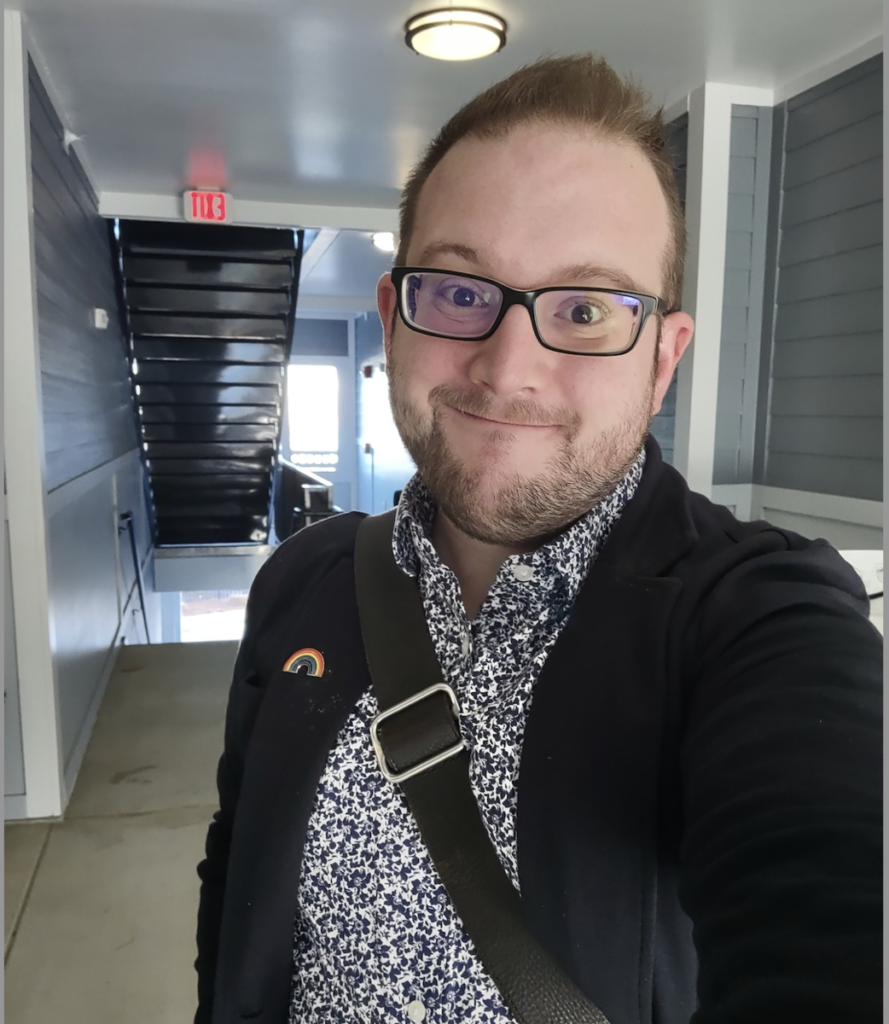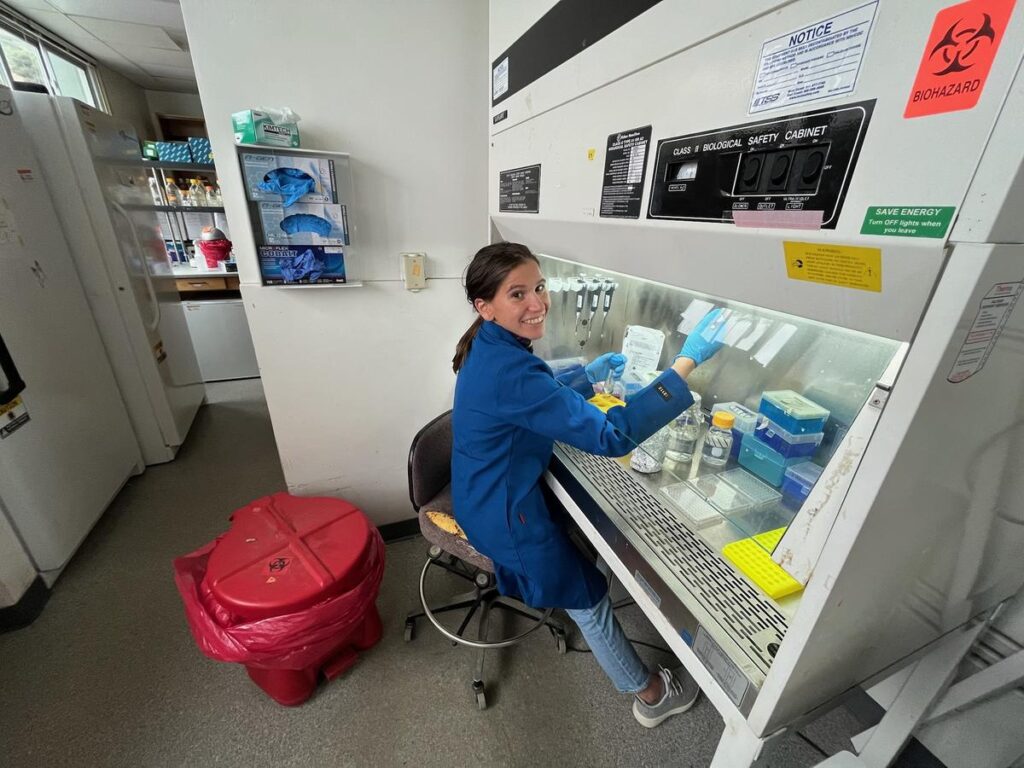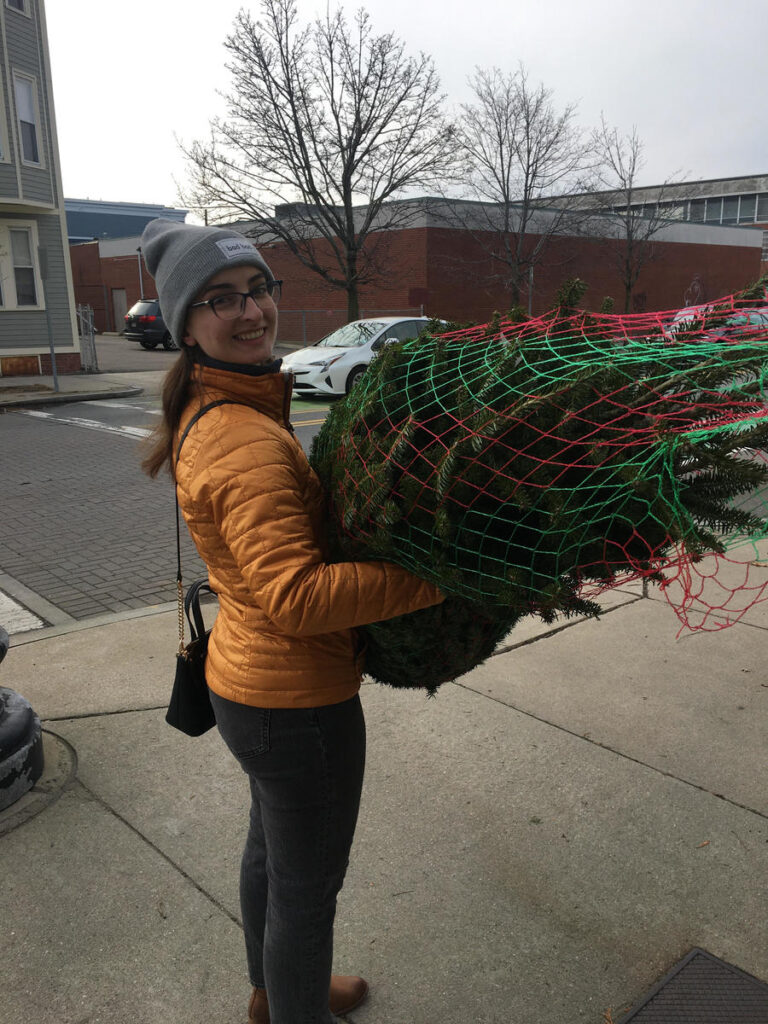All-Star Alum Q&A Part II: Chiappini, Bushin, Lavagnino
Princeton Chemistry alumni Nick Chiappini *22, Leah Bushin *21, and Marissa Lavagnino *22 have moved up and moved on, having successfully defended their dissertations and found work outside of Princeton Chemistry. What have the intervening months been like for them, and how do they view their time at Frick? In this All-Star Q&A Part II, we get some answers on life and work in the real world from three recent alums. (Here is Part I, which ran last week.)
NICHOLAS CHIAPPINI *22/KNOWLES LAB
What have you been up to since you left Princeton Chemistry? I started as an assistant professor in chemistry at University of North Carolina, Wilmington. This semester has been an adventure of getting my own research group going and teaching while getting the lay of the land in a new place.

Nicholas D. Chiappini is now an assistant professor at the University of North Carolina Wilmington.
What is the best part of being “out on your own”? The best part? Honestly, feeling the freedom to be able to pursue any research idea I come up with and creating my own research area out of things that interest me. The courage to do that definitely was fostered in my time in the Knowles Group. Rob was my biggest cheerleader and gave me a wide berth to explore.
What are some of the challenges you didn’t anticipate? Finding time for everything. I’ve become inextricably bound to my Google Calendar to make everything work. Best-laid grand plans can easily be thwarted by meetings or classes or life. Another would be just trying to build a new social sphere as an adult in a new city without the inbuilt social network of a graduate student or postdoc cohort, but I’ve made strides.
Looking back, what’s your best advice for those soon-to-launch? Wrap up anything and everything you can for in-progress works before you leave. You definitely don’t want to be in a scenario where the last killer experiments for your project are on-hold until you can convince someone to do them. I’m extremely thankful I pushed through and got all the experimental work I needed to done before leaving.
Also, make sure you have ways to connect with all the people you’ve met at Princeton Chemistry. Your network is one of the most powerful things you have and can come in unbelievably handy at so many future junctures. Send that LinkedIn request to your committee members or faculty, staff, students you met and vibed with.
LEAH BUSHIN *21/MO LAB
What have you been up to since you left Princeton Chemistry? I am a postdoc in Professor Bradley Moore’s group in the Center for Marine Biotechnology and Biomedicine at Scripps Institution of Oceanography, University of California, San Diego. I am gaining new skills and expertise in the areas of synthetic biology, metabolic engineering, and systems biology. I am focused on projects that think about how we can take basic chemical discoveries from nature—for example, a genetic pathway from a marine microbe—and repurpose them towards addressing pressing environmental or biomedical challenges like the sustainable production of chemicals or the development of ‘living’ medicines.
SIO is special for its proximity to the ocean and access to biodiversity/samples collected locally and on research cruises from across the globe. The biosynthetic pathway that is the cornerstone of my project was discovered just outside the door, from the La Jolla Submarine Canyon.

Leah Bushin is now with the Center for Marine Biotechnology and Biomedicine at Scripps Institution of Oceanography, University of California, San Diego.
What is the best part of being “out on your own”? My postdoc advisor Brad Moore encourages us to go after the scientific questions that excite us most and chart our own directions, even if it’s a new direction for his group. This has been thrilling scientifically and also critical for my development as an independent researcher, enabling me to train in new areas and build confidence in my own ideas.
What are some of the challenges you didn’t anticipate? Stepping out of your comfort zone can be daunting. It can be tempting to try to fall back on your expertise from your Ph.D. training, especially when you have setbacks in the lab, bumps in the road. I would ask myself, ‘Why didn’t I just stick with what I know?’ But you have to accept that initial progress may be slow and circuitous. It’s totally worth it, though. My sense of what is scientifically possible as well as what I am capable of has completely expanded.
Looking back, what’s your best advice for those soon-to-launch? A postdoc is a unique opportunity to build on your training and continue to define your scientific interests. I have found it reinvigorating and am in awe of how much I continue to learn each day.
MARISSA LAVAGNINO *22/MACMILLAN LAB
What have you been up to since you left Princeton Chemistry? After my thesis defense, I said goodbye to the MacMillan Lab and traveled to Europe. I aimed to make good on all the offers of former lab postdocs to show me around their home cities (always be sure to do that). Then came Princeton Commencement, which I would recommend attending. It was a remarkably effective way to close the door on my graduate studies and mentally transition to ‘whatever comes next.’ In my case, this was moving up to the Boston area to start my postdoc in the Radosevich lab at MIT. My research has transitioned from studying metal-catalyzed, light-driven reactions to main group-catalyzed, thermally driven reactions. I’ve enjoyed living in Somerville—a town very close to Cambridge and MIT—and exploring the greater Boston area by ‘T’ and bicycle. We will have to see how I survive my first true New England winter.

Marissa Lavagnino, pictured here buying her Christmas tree last month, has started her postdoc in the Radosevich lab at the Massachusetts Institute of Technology.
What is the best part of being “out on your own”? The best part is the creative and professional freedom that comes from having completed my Ph.D. I did not anticipate how much it would affect my mindset to be finished with my terminal degree. Without the concern of completing requirements and defending a thesis, I feel like a fully qualified chemist who could work in and contribute her skills to a variety of fields and professions. That kind of empowerment encouraged me to become more creative and broadened my perspective on the kind of impact chemistry can have in other fields, both academic and nonacademic.
What are some of the challenges you didn’t anticipate? Not all chemistry departments offer free coffee at a convenient little cafe in the atrium … cherish it. But on a more serious note, it has been surprisingly challenging to adapt to a new chemistry department. Five years is a long time to spend somewhere, and by the end of my time at Princeton I knew where all the rooms were, whom to ask for what, etc. Especially with a short appointment like a postdoc, it’s a little daunting to imagine learning all the ropes of a new department that I’ll most likely have to leave soon. On the whole, however, the transition to being a postdoc and living in Boston was more natural for me than I would have guessed, and there haven’t been many bumps in the road.
Looking back, what’s your best advice for those soon-to-launch? Training as a chemist does not mean you have to work strictly as a chemist. This has become so clear to me working in the Kendall Square-MIT area. Chemistry is a remarkably versatile skillset that has applications to many different areas, so don’t limit yourself professionally based on the relatively narrow scope of options you are exposed to in graduate school. I have friends who have applied their chemical education and experience to law, to business management, to software development and sales, to venture capital and sustainability initiatives. I would suggest applying for that interdisciplinary internship advertised by the department or attending that company event where you can meet people from other departments. You also have a great network of people from your time in graduate school. Keep in touch with them and learn from the opportunities they pursue. A surprising number of fields and industries need chemists, so keep your eyes and ears and minds open to opportunities as they pop up.
